 W
WThe Atherstone Ball Game is a "medieval football" game played annually on Shrove Tuesday in the English town of Atherstone, Warwickshire. The game honours a match played between Leicestershire and Warwickshire in 1199, when teams used a bag of gold as a ball, and which was won by Warwickshire. At one time similar events were held in many towns throughout England, but Atherstone's is now one of at last three such games that are still played each year at Shrovetide, the others being the Royal Shrovetide Football match held in Ashbourne, Derbyshire, and The Alnwick Shrovetide Football Match in Alnwick, Northumberland.
 W
WBull running was a medieval custom practiced in England until the 19th century. It involved chasing a bull through the streets of a town until it was weakened, then slaughtering the animal and butchering it for its meat. Bull running became illegal in 1835, and the last bull run took place in Stamford, Lincolnshire, in 1839. The practice was not confined to any particular region, with bull runs also documented at Axbridge in the south west, Canterbury and Wokingham in the south east, Tutbury in the midlands, and Wisbech in the east.
 W
WA bumps race is a form of rowing race in which a number of boats chase each other in single file, each crew attempting to catch and ‘bump’ the boat in front without being caught by the boat behind.
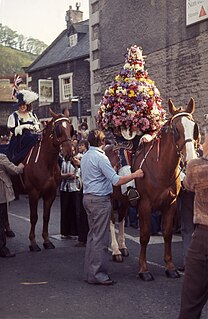 W
WCastleton Garland Day or Garland King Day is held annually on 29 May in the town of Castleton in the Derbyshire Peak District. The Garland King, on horseback, and covered to the waist in a heavy, bell-shaped floral garland, leads a procession through the town.
 W
WThe Cooper's Hill Cheese-Rolling and Wake is an annual event held on the Spring Bank Holiday at Cooper's Hill, near Gloucester in England. Participants race down the 200-yard-long hill after a round of Double Gloucester cheese is sent rolling down it. The event was traditionally held by and for the people who live in the local village of Brockworth, but now people from all over the world take part. The Guardian called it a "world-famous event", with winners coming from Canada, Australia, New Zealand, and Nepal.
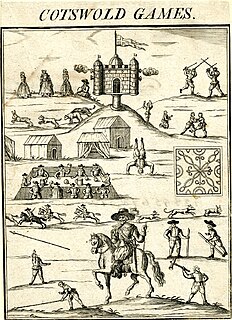 W
WThe Cotswold Olimpick Games is an annual public celebration of games and sports now held on the Friday after Spring Bank Holiday near Chipping Campden, in the Cotswolds of England. The games likely began in 1612 and ran until they were fully discontinued in 1852. However, they were revived in 1963 and still continue as of 2020.
 W
WCowes Week is one of the longest-running regular regattas in the world. With 40 daily sailing races, up to 1,000 boats, and 8,000 competitors ranging from Olympic and world-class professionals to weekend sailors, it is the largest sailing regatta of its kind in the world. Having started in 1826, the event is held in August each year on the Solent, and is run by Cowes Week Limited in the small town of Cowes on the Isle of Wight.
 W
WEngland, England is a satirical postmodern novel by Julian Barnes, published and shortlisted for the Booker Prize in 1998. While researchers have also pointed out the novel's characteristic dystopian and farcical elements, Barnes himself described the novel as a 'semi-farce'.
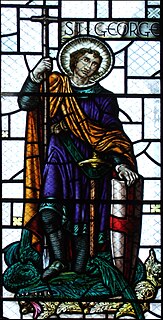 W
WSaint George is the patron saint of England in a tradition established in the Tudor period, based in the saint's popularity during the times of the Crusades and the Hundred Years' War.
 W
WHenley Royal Regatta is a rowing event held annually on the River Thames by the town of Henley-on-Thames, England. It was established on 26 March 1839. It differs from the three other regattas rowed over approximately the same course, Henley Women's Regatta, Henley Masters Regatta, and Henley Town and Visitors' Regatta, each of which is an entirely separate event.
 W
WA hot cross bun is a spiced sweet bun usually made with fruit, marked with a cross on the top, and traditionally eaten on Good Friday in historically Commonwealth countries such as the United Kingdom, Ireland, Australia, India, New Zealand, South Africa, Canada, and some other parts of the Americas, including the United States.
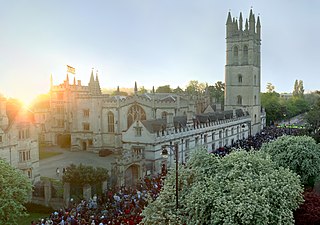 W
WThe Hymnus Eucharisticus is a traditional hymn sung by the choir of boy choristers and academical clerks of Magdalen College, Oxford in England, supported by professional stipendary clerks. The choristers are boys from Magdalen College School and the academical clerks are students from Magdalen College at the University. The hymn is best known for its role in the events of May Morning, a 500-year-old tradition where the choir sings the hymn from Magdalen Tower at 6 a.m. each year on 1 May. This initiates the annual May Morning celebrations in Oxford. Large crowds gather in the High Street and on Magdalen Bridge to listen. The sound is very faint, although more recently amplification has been used. The crowds then disperse for other celebratory activities such as Morris Dancing. The hymn is also sung from the gallery of the college's Great Hall during important college occasions.
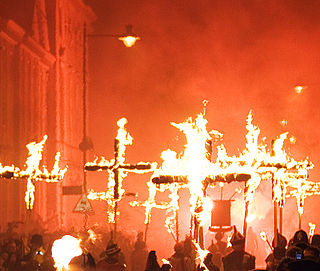 W
WLewes Bonfire, or Bonfire for short, describes a set of celebrations held in the town of Lewes, Sussex, England, that constitute the United Kingdom's largest and most famous Bonfire Night festivities, with Lewes being called the bonfire capital of the world.
 W
WThe Lion sermon is an annual sermon preached on 16 October at 13:00 at St Katharine Cree in the City of London. The sermon has traditionally been preached on the theme of 'challenges to the Christian faith'.
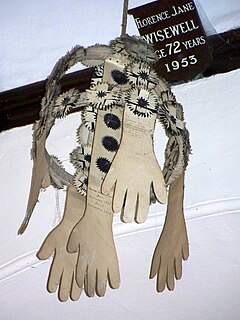 W
WA maiden's garland, also known as a virgin's crown, crants or crantsey, is a crown-shaped garland used as a funeral memento for, usually female, virgins. They are generally made of paper flowers, rosettes and ribbons fixed to a wooden frame. Many are also adorned with white paper gloves, and may be inscribed with verses of poetry and the name of the deceased. The garlands are carried before, or on, the coffin during the funeral procession and afterwards displayed in the church. W. R. Bullen, writing in The Tablet in 1926, reports that the "practice of carrying garlands at a maiden's funeral was common in England, Wales and Scotland before the Reformation and after it for two hundred years or more, but the custom has now almost entirely fallen into disuse." Shakespeare refers to the custom in his play Hamlet, when describing the burial of Ophelia: her death was doubtful, and, but that great command o'ersways the order, she should in ground unsanctified have lodged till the last trumpet; for charitable prayers, shards, flints and pebbles should be thrown on her; yet here she is allow'd her virgin crants, her maiden strewments, and the bringing home of bell and burial.
 W
WMay Morning is an annual event in Oxford, United Kingdom, on May Day.
 W
WMay Week is the name used in the University of Cambridge to refer to a period at the end of the academic year. Originally May Week took place in the week during May before year-end exams began. Nowadays, May Week takes place in June after exams, and is a cause for great celebration amongst the students of the University. Highlights of the week include bumps races, May Balls, June Events and garden parties.
 W
WA maypole is a tall wooden pole erected as a part of various European folk festivals, around which a maypole dance often takes place.
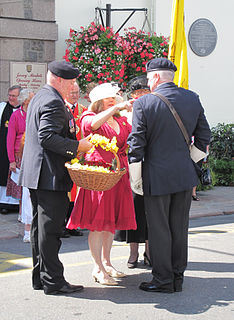 W
WMinden Day is a regimental anniversary celebrated on 1 August by certain units of the British Army. It commemorates the participation of the forerunners of the regiments in the Battle of Minden during the Seven Years' War on that date in 1759.
 W
WIn the coastal town of Minehead, located in the southwest English county of Somerset, there is a folk custom on May Day entailing the parading of a brightly decorated hobby horse around the locality.
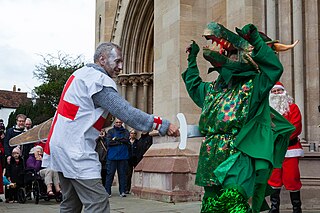 W
WMummers' plays are folk plays performed by troupes of amateur actors, traditionally all male, known as mummers or guisers. Historically, mummers' plays consisted of informal groups of costumed community members that visited from house to house on various holidays. Today the term refers especially to a play in which a number of characters are called on stage, two of whom engage in a combat, the loser being revived by a doctor character. This play is sometimes found associated with a sword dance though both also exist in Britain independently.
 W
WThe New Forest coven were an alleged group of witches who met around the area of the New Forest in southern England during the early 20th century. According to his own claims, in September 1939, a British occultist named Gerald Gardner was initiated into the coven and subsequently used its beliefs and practices as a basis from which he formed the tradition of Gardnerian Wicca. Gardner described some of his experiences with the coven in his published books Witchcraft Today (1954) and The Meaning of Witchcraft (1959) although on the whole revealed little about it, saying he was respecting the privacy of its members. Meanwhile, another occultist, Louis Wilkinson, corroborated Gardner's claims by revealing in an interview with the writer Francis X. King that he too had encountered the coven and expanded on some of the information that Gardner had provided about them. According to Gardner, the faith which they followed was the continuation of the Witch-Cult, a pre-Christian religion that originated in the paganism of ancient Western Europe. This was in keeping with the widely held theories then propagated by the anthropologist Margaret Murray and her supporters.
 W
WRestoration Day, more commonly known as Oak Apple Day or Royal Oak Day, was an English public holiday, observed annually on 29 May, to commemorate the restoration of the English monarchy in May 1660. In some parts of the country the day is still celebrated. It has also been known as Shick Shack Day, or Oak and Nettle Day.
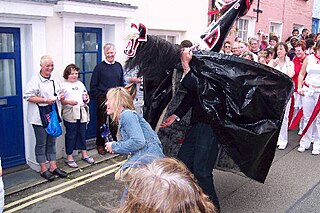 W
WThe 'Obby 'Oss festival is a folk custom that takes place each May Day in Padstow, a coastal town in North Cornwall. It involves two separate processions making their way around the town, each containing an eponymous hobby horse known as the 'Obby 'Oss.
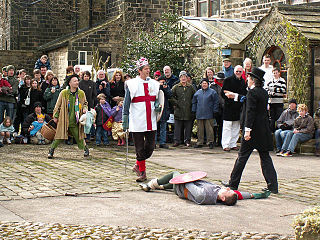 W
WThe Pace Egg plays are an Easter custom in rural Northern England in the tradition of the medieval mystery plays. The practice was once common throughout Northern England, but largely died out in the nineteenth century before being revived in some areas of Lancashire and West Yorkshire in the twentieth century. The plays, which involved mock combat, were performed by Pace Eggers, who sometimes received gifts of decorated eggs from villagers. Several closely related folk songs were associated with Pace Egging.
 W
WThe Perambulation of the Town Leat is a traditional mediaeval custom, also known as water-bailing, that takes place in the town of Tiverton, Devon, England, once every seven years. The event commemorates and claims the gift of the town's water supply in around 1262 from Isabella, Countess of Devon.
 W
WPlough Sunday is a traditional English celebration of the beginning of the agricultural year that has seen some revival over recent years. Plough Sunday celebrations usually involve bringing a ploughshare into a church with prayers for the blessing of the land. It is traditionally held on the Sunday after Epiphany, the Sunday between 7 January and 13 January. Accordingly, work in the fields did not begin until the day after Plough Sunday: Plough Monday. Although the nature of farming has changed over the centuries, Plough Sunday is seen as a way of generally celebrating farming and the work of farmers. In the Church of England book of liturgy, Common Worship: Times and Seasons, there is a suggested prayer for the "Blessing of the Plough", for the "Blessing of Seed" and passages of Scripture related to the agricultural theme.
 W
WThe Royal Shrovetide Football Match is a "Medieval football" game played annually on Shrove Tuesday and Ash Wednesday in the town of Ashbourne in Derbyshire, England. Shrovetide ball games have been played in England since at least the 12th century from the reign of Henry II (1154–89). The Ashbourne game also known as "hugball" has been played from at least c.1667 although the exact origins of the game are unknown due to a fire at the Royal Shrovetide Committee office in the 1890s which destroyed the earliest records. One of the most popular origin theories suggests the macabre notion that the 'ball' was originally a severed head tossed into the waiting crowd following an execution. Although this may have happened, it is more likely that games such as the Winchelsea Streete Game, reputedly played during the Hundred Years' War with France, were adaptations of an original ball game intended to show contempt for the enemy.
 W
WSimnel cake is a fruitcake widely eaten in the United Kingdom, Ireland and other countries with patterns of migration from them, associated with Lent and Easter. It is distinguished by layers of almond paste or marzipan, typically one in the middle and one on top, and a set of eleven balls made of the same paste. It was originally made for the fourth Sunday in Lent, also known as Laetare Sunday, the Refreshment Sunday of Lent, Mothering Sunday, the Sunday of the Five Loaves, or Simnel Sunday – named after the cake. In the United Kingdom it is now commonly associated with Easter Sunday.
 W
WSwan upping is an annual ceremony in England in which mute swans on the River Thames are rounded up, caught, ringed, and then released.
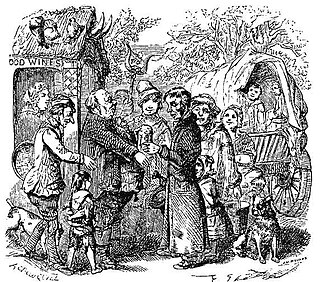 W
WSwearing on the Horns is a farcical oath that was traditionally given to visitors at various pubs in the London suburb of Highgate during the 17th, 18th and 19th centuries. The oath consists of a series of statements read by a clerk, confirming one's dedication to merriment and debauchery; those being sworn in would agree to each statement, kiss or salute a set of horns, and be entered in a logbook for posterity.
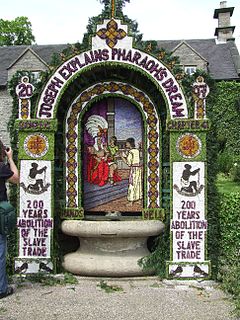 W
WWell dressing, also known as well flowering, is a tradition practised in some parts of rural England in which wells, springs and other water sources are decorated with designs created from flower petals. The custom is most closely associated with the Peak District of Derbyshire and Staffordshire. James Murray Mackinlay, writing in 1893, noted that the tradition was not observed in Scotland; W. S. Cordner, in 1946, similarly noted its absence in Ireland. Both Scotland and Ireland do have a long history of the veneration of wells, however, dating from at least the 6th century.